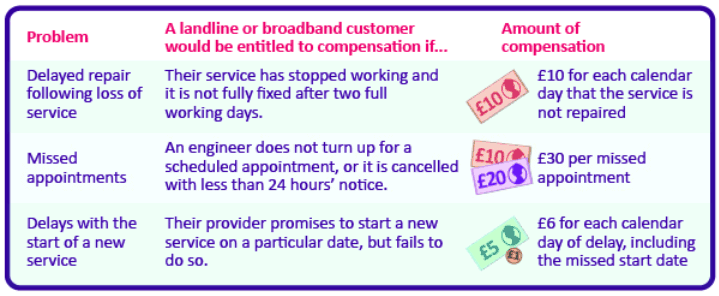UPD Citizens Advice Warn of Watered Down Broadband Compensation System
The Citizens Advice agency has estimated the cost of BT, Virgin Media and Sky Broadband’s proposed voluntary system for handling automatic compensation, which would be paid during a total loss of broadband service. But consumers could receive 32% less than via Ofcom’s own plan.
Let’s recap. Back in March 2017 Ofcom unveiled their chosen solution for a new mandatory system of Automatic Compensation for protracted losses of broadband service, missed engineering appointments and delayed installs. As part of that announcement the regulator also rejected a weaker voluntary proposal from BT, Sky Broadband and Virgin Media (here). We note that TalkTalk similarly rejected the voluntary plan (here).
At the time the regulator said of the voluntary proposal: “We do not think that the industry proposal sufficiently meets our concerns when quality of service falls short.” Since then the big ISPs have been attempting to improve upon their proposal and Ofcom are due to make a final announcement by the end of 2017.
Advertisement
One of the biggest concerns that the opposing ISPs have is that the level of compensation is significantly higher than what consumers typically pay for the service itself and any extra costs will of course need to be passed on to end-users. Ofcom estimated that its own plan (see illustration below) would mean up to 2.6 million customers could receive up to £185 million in compensation payments each year.
A quick ‘back of the fag packet’ bit of math suggests that £185m divided by c.26 million UK broadband lines works out at about £7.11 extra per line per year or roughly 60p per month. The real terms increase may be less than that of course, not least since Ofcom expects that the system would provide an “incentive” for ISPs to improve (note: technically most such problems are often down to suppliers like Openreach, not the ISPs).

However Citizens Advice has claimed that the latest counter proposal from the opposing ISPs would “short-change” consumers by requiring providers to pay out £7 a day for a loss of connectivity (down from £10), £20 for a missed engineer appointment (down from £30) and £4 a day for late installs (down from £6). All of that amounts to about 32% less than Ofcom’s plan.
Advertisement
Gillian Guy, Head of Citizens Advice, said:
“A watered down compensation scheme would short-change customers by millions of pounds. Thousands of people each year seek our help when their provider fails to repair or set up their broadband. Some people are left without a working internet connection for weeks despite numerous calls to their provider or no-shows from engineers.
Broadband is now an essential service, with households relying on it for everyday activities, so a lack of a working service can make day-to-day tasks more difficult.
The regulator must hold its ground and introduce a compulsory automatic compensation scheme that clearly lays out how much consumers are entitled to when they get poor service, with the amount providers have to pay reflecting as closely as possible the detriment faced by consumers.”
In fairness, when considering the “short-change” remark, it’s worth remembering that this has to be balanced against the fact that most broadband subscribers will probably end up shouldering the burden for this through price rises. On that point we think it might be interesting to ask consumers what they think, so here’s a snap poll.
[poll id=”17″]
Once finalised any new system will probably take another year or so before it can be introduced, which is partly because the plan would require significant internal changes to existing admin systems. This may prove particularly difficult for some smaller ISPs to deliver.
NOTE: There also appear to be a few other subtle differences between how the payments are handled.
Advertisement
|
Loss of service |
Delayed installation |
Missed appointment |
|
|
Proposed industry payment (June 2017) |
£7 per calendar day for loss of service beyond two working days |
£4 per calendar day (only payable automatically if customer subsequently activates) |
£20 for a missed appointment slot or cancellation with less than 24 hours |
|
Ofcom payment |
£10 per calendar day beyond two working days after the provider becomes aware of the loss |
£6 per calendar day beyond the date that the provider has committed to in a written form |
£30 for a missed or cancellation with less than 24 hours |
The agency suggests that their figures for the industry proposal are also “likely to be an underestimate of the how much consumers might lose as the industry’s proposed scheme also allows providers to place a cap on total payments, and to only pay compensation for delayed activation if the customer subsequently activates the service“.
UPDATE 11:52am
The UK Internet Service Providers Association (ISPA) has given their reaction.
Andrew Glover, Chair of ISPA Council, said:
“The vast majority of UK broadband customers receive a very good service, but when things go wrong, the industry agrees that customers are entitled to compensation. Internet service providers fully support the principle of automatic compensation, but we do not believe that Ofcom’s suggested approach fully recognises the dynamics and complexities of the UK broadband market – the suggested compensation levels are out of proportion compared to the generally low prices that consumers pay in the UK and risk diverting resources away from rolling out faster connections throughout the country.
The industry is currently engaging with Ofcom to determine the best level of compensation and Citizen Advice’s research is based on figures that are not any longer up to date. The alternative voluntary approach that has been suggested would not only provide consumers an automatic right to compensation more in line with the overall cost of broadband services but could also be implemented in a much swifter way.
A key aim of any automatic compensation policy should ultimately be to minimise disruption to consumer’s services. We need to strike the right balance between helping providers to address the discrepancies in the market and allowing them to continuously invest in their networks and maintain competitive prices for their products.”
Mark is a professional technology writer, IT consultant and computer engineer from Dorset (England), he also founded ISPreview in 1999 and enjoys analysing the latest telecoms and broadband developments. Find me on X (Twitter), Mastodon, Facebook, BlueSky, Threads.net and Linkedin.
« Revealing G.fast’s Broadband Speed Improvement Since Openreach’s Trial

















































Comments are closed